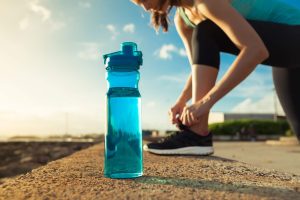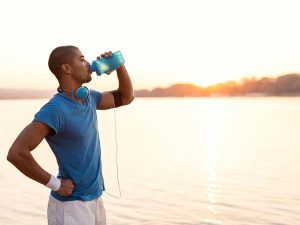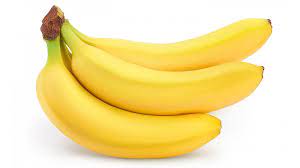When it comes to shedding those extra pounds, staying hydrated is often overlooked. However, the truth is that hydration plays a crucial role in our weight loss journey. In this article, we will explore the significance of staying properly hydrated and how it can contribute to reaching our weight loss goals. So, grab a glass of water and let’s dive into the importance of hydration in weight loss!
Table of Contents
ToggleUnderstanding the Role of Hydration in Weight Loss
The Basics of Hydration
Hydration is the process of taking in and absorbing fluids to maintain the body’s water balance. Water makes up a significant portion of our body weight and plays a crucial role in various bodily functions. It is essential for the proper functioning of cells, organs, and systems. On average, the human body is comprised of approximately 60% water, highlighting its significance in maintaining overall health.
How Does Hydration Affect Weight Loss?
Many people may not realize the impact that hydration can have on their weight loss efforts. When it comes to shedding those extra pounds, water plays a key role in several ways. By understanding how hydration affects weight loss, you can optimize your strategy and make the most out of your efforts.
Why is Staying Hydrated Important?
Staying hydrated is important for overall health, but it also holds particular value when it comes to weight loss. By keeping your body adequately hydrated, you provide it with the necessary tools to function optimally. Water aids in digestion, nutrient absorption, thermoregulation, and metabolism – all of which directly or indirectly influence your ability to lose weight effectively.
The Impact of Dehydration on Weight Loss Efforts
Dehydration and Metabolism
One significant way in which dehydration affects weight loss efforts is by slowing down the metabolism. When your body lacks sufficient water, it goes into survival mode, decreasing its energy expenditure to conserve fluids. As a result, your metabolic rate may decline, making it more challenging to burn calories and lose weight.
Dehydration and Calorie Burning
In addition to affecting metabolism, dehydration can also hinder the calorie-burning process. When your body is dehydrated, it lacks the necessary resources to properly break down and utilize stored fats for energy. This can lead to a decrease in fat burning and potentially hinder your weight loss goals.
Dehydration and Exercise Performance
Dehydration can have a significant impact on your exercise performance, potentially reducing the effectiveness of your workouts. When you are dehydrated, your body may struggle to regulate temperature efficiently, causing you to feel fatigued more quickly. This can result in reduced endurance, stamina, and overall exercise performance, making it harder to achieve your weight loss objectives.
Hydration as a Natural Appetite Suppressant
The Link Between Hydration and Hunger
Did you know that sometimes, feelings of hunger can actually be mistaken for thirst? The brain often misinterprets thirst signals as hunger cues, leading us to eat more when, in reality, all we need is a glass of water. By staying hydrated, you can help differentiate between true hunger and thirst, potentially reducing unnecessary calorie consumption.
Drinking Water to Reduce Food Intake
Increasing your water intake before meals can also help reduce food intake. Water has a natural appetite-suppressing effect, as it fills up space in the stomach, creating a feeling of fullness. By drinking water before a meal, you may find yourself eating smaller portions, which can contribute to weight loss over time.
Replacing High-Calorie Drinks with Water
Another way in which hydration can aid in weight loss is by replacing high-calorie drinks with water. Many popular beverages, such as sugary sodas or fruit juices, are loaded with empty calories that can hinder your weight loss efforts. By substituting these calorie-dense drinks with water, you can significantly reduce your overall calorie intake, contributing to weight loss.
Water’s Role in Digestion and Nutrient Absorption
Water and Optimal Digestion
Water plays a critical role in the digestion process. It helps break down food, aids in the absorption of nutrients, and facilitates the smooth movement of waste through the digestive system. Without adequate hydration, digestion can be compromised, leading to issues such as constipation or bloating. By staying hydrated, you promote optimal digestive function, which can support your weight loss journey.
Water for Nutrient Absorption
In addition to aiding digestion, water is also essential for the absorption of nutrients from food. When your body is properly hydrated, nutrients can easily be transported from the digestive system into the bloodstream, where they can be utilized by the body for various processes. Insufficient hydration can hinder the absorption of essential nutrients, potentially affecting overall health and weight loss efforts.
Dehydration’s Impact on Digestion
On the other hand, dehydration can have a negative impact on digestion. When the body lacks water, it may struggle to break down food effectively, leading to discomfort and potentially interfering with weight loss. Proper hydration ensures that food can be properly digested and eliminated, allowing your body to efficiently process nutrients and waste.
The Importance of Water in Regulating Body Temperature
Water’s Role in Thermoregulation
Your body relies on water to regulate its temperature, especially during physical activity or in warm environments. Sweating is one of the mechanisms through which the body cools down, and this process requires an adequate intake of water. When you are well-hydrated, your body can maintain optimal temperature regulation, allowing you to engage in physical activities without placing excessive stress on your system.
Dehydration and Heat-Related Issues
Dehydration can significantly impact your body’s ability to regulate temperature, leading to heat-related issues such as heat exhaustion or heatstroke. These conditions can be dangerous, particularly during intense exercise or exposure to high temperatures. By staying properly hydrated, you minimize the risk of these heat-related problems, enabling you to engage in activities that support your weight loss goals.
Importance of Water During Exercise
Regular exercise is an integral part of any successful weight loss plan, and staying hydrated during exercise is crucial. When you sweat, your body loses water and electrolytes, which can lead to dehydration if not replenished. It’s important to drink water before, during, and after exercise to maintain optimal hydration levels and support your overall weight loss efforts.
Hydration for Optimal Metabolism
Water and Metabolic Rate
One of the lesser-known benefits of staying hydrated is its impact on metabolic rate. Studies have shown that even mild dehydration can decrease metabolic function, leading to a slower metabolism. An efficient metabolism is essential for burning calories and shedding excess weight. By ensuring you are adequately hydrated, you can support a healthy metabolic rate and enhance your weight loss potential.
Effect of Dehydration on Metabolic Function
Dehydration can have a negative effect on metabolic function, potentially slowing down calorie burning and impeding weight loss efforts. When your body lacks water, it conserves energy and reduces its overall metabolic rate. This can make it more challenging to achieve a caloric deficit, which is essential for losing weight. By staying hydrated, you keep your metabolism running optimally, supporting your weight loss journey.
Staying Hydrated to Enhance Weight Loss
Incorporating proper hydration practices into your weight loss plan can significantly enhance your results. By consistently drinking enough water throughout the day, you provide your body with the foundation it needs to function optimally. This includes maintaining a healthy metabolic rate, burning calories efficiently, and supporting various bodily processes that contribute to weight loss.
The Connection Between Hydration and Fat Breakdown
Water’s Role in Lipolysis
Lipolysis is the process by which stored fats are broken down and converted into energy. Water plays a crucial role in this process, as it is needed for the efficient transportation of fatty acids throughout the body. Without adequate hydration, lipolysis may be compromised, hindering the breakdown of fats and potentially impairing your weight loss progress.
Hydration for Efficient Fat Burning
By staying hydrated, you optimize your body’s ability to burn fat efficiently. When your cells are adequately hydrated, they can more effectively break down and utilize stored fats for energy. This can expedite the weight loss process and help you achieve your goals more quickly. Additionally, water aids in the removal of waste products generated during fat breakdown, ensuring their efficient elimination from the body.
Importance of Water During Ketosis
For those following a ketogenic diet, hydration becomes even more critical. The ketogenic diet relies on the breakdown of fats for energy, which creates ketones as a byproduct. Proper hydration is necessary to eliminate these ketones, preventing their buildup and potential negative effects on the body. By staying well-hydrated, you support the success of a ketogenic diet and enhance your weight loss efforts.
Tips for Staying Hydrated During Weight Loss
Setting a Daily Water Intake Goal
To stay adequately hydrated during weight loss, it’s important to set a daily water intake goal. While individual needs may vary, a general guideline is to aim for at least 8 cups (64 ounces) of water per day. However, factors such as activity level, climate, and overall health should be considered when determining your personal hydration needs. Setting a specific goal can help you track your water intake and ensure you are consistently hydrating throughout the day.
Optimal Timing of Water Consumption
Spacing out your water consumption throughout the day can help ensure optimal hydration. It’s recommended to drink water at regular intervals rather than consuming large amounts in one sitting. For example, sipping water gradually over the course of the day and drinking a glass before each meal can help keep you hydrated and prevent sudden increases in fluid intake.
Healthy Hydration Alternatives
While plain water is the best choice for hydration, there are other healthy alternatives you can incorporate into your routine. Herbal teas, infused water with fruits or herbs, and homemade fruit juices can add variety to your hydration routine while still providing the essential fluids your body needs. However, be mindful of added sugars or artificial sweeteners in flavored drinks, as they may counteract the benefits of hydration and hinder weight loss progress.
Monitoring Hydration Levels for Weight Loss Success
Signs of Dehydration to Watch Out For
Monitoring your hydration levels is crucial for weight loss success. Being aware of the signs of dehydration can help you address any hydration imbalances promptly. Some common signs of dehydration include increased thirst, dry mouth, dark-colored urine, fatigue, dizziness, and dry skin. If you experience these symptoms, it’s essential to increase your water intake to rehydrate your body.
Tracking Water Intake
To ensure you’re meeting your hydration goals, tracking your water intake can be helpful. Methods such as using a water bottle with markings indicating the amount of water consumed or utilizing mobile apps specifically designed for tracking hydration can assist in monitoring your progress. By keeping a record of your water intake, you can identify patterns, make adjustments as needed, and stay on track with your weight loss goals.
Using Technology to Monitor Hydration
In today’s digital age, various technologies can aid in monitoring hydration levels. Smart water bottles with built-in sensors can track your water consumption and remind you to drink at regular intervals. Additionally, wearable fitness trackers can provide insight into your activity levels and help you gauge when you may need to increase your water intake. Leveraging these technological tools can contribute to your weight loss success by ensuring you stay properly hydrated.
Conclusion
When it comes to weight loss, hydration is often underestimated. Yet, staying adequately hydrated plays a vital role in supporting various aspects of weight loss, including metabolism, appetite regulation, digestion, and fat breakdown. By understanding the importance of hydration and implementing practical strategies to stay hydrated, you can optimize your weight loss efforts and improve your chances of achieving your desired results. Remember to drink water regularly, set a hydration goal, monitor your water intake, and listen to your body’s signals for thirst. With proper hydration, you can enhance your overall health and make your weight loss journey a more successful and enjoyable one.









